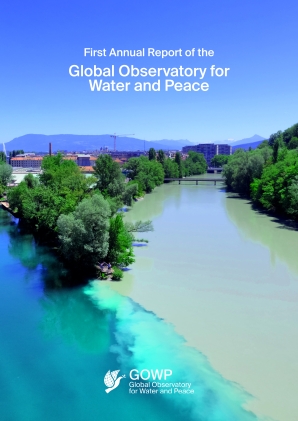Global Observatory On Water And Peace Launches First Report
Calls For New Approaches To Cross-border Diplomacy
3 Apr 2022 by The Water Diplomat
DAKAR, Senegal

The Geneva Water Hub (GWH) released the first report of the Global Observatory for Water and Peace in Dakar, Senegal, on the 22nd of March 2022.
The GWH aims to understand and prevent water-related tensions between competing uses, public and private actors, political entities, and countries. It acts as the Secretariat for the Global Observatory on Water and Peace (GOWP), following the recommendations of the Global High-Level Panel on Water and Peace in 2017.
The GOWP report synthesises discussions between politicians, diplomats, water actors, and peace and security sector actors in different regional and thematic ‘nodes’ on the importance of water management as a vector for peace.
The report notes that with 275 transboundary basins on the planet, more than 90% of the world's population live in countries that share river and lake basins. These shared basins are home to 40% of the world's population. As water is shared across borders, new water governance and diplomacy approaches are needed.
Water has rarely been cited as a direct cause of armed conflict and there is scant evidence of formal water wars. On the other hand, more than 2 billion people live in water-scarce regions which have seen 10% of all global migration. Also, transboundary river basins are frequently located in areas marked by interstate tensions or armed conflict.
While conflicts are not always directly related to water issues, confrontation over water and the use of water resources as an intimidation tactic can fuel more widespread conflict. Likewise, water scarcity has a detrimental effect on international peace and security. Droughts in one region can increase food prices and deteriorate socioeconomic conditions in another, exacerbating tensions and precipitating conflict.
Water can profoundly affect the landscape of domestic, regional, and international relations. With large-scale urban water infrastructures being destroyed or captured during inter- and intra-state disputes, water resources are increasingly targeted in contemporary conflicts. There have been instances where water supply lines have been deliberately poisoned to intimidate civilians. Captured dams are either used to flood or to starve the people living downstream. People are forced to flee their homes. Agricultural operations are disrupted and diseases are spread.
Water diplomacy, therefore, enables countries to work out water management agreements. The participation of water users at multiple levels of governance is necessary for transboundary water agreements to work more effectively on the ground.
When dealing with water diplomacy, sovereign states must be involved, but the process should also be open to other stakeholders, such as municipalities, provincial governments, and civil society. This can better incorporate biodiversity conservation into water management to integrate government priorities for natural resource security and economic growth.
To elucidate water issues, two (or more) parties ought to come together to negotiate joint transboundary water agreements, with or without the assistance of an external party. In an atmosphere of mutual trust and confidence, these agreements can range from commitments to provide access to technical information to the establishment of river basin organizations.
Using a third party to mediate disputes over shared water resources opens new avenues for promoting mutual understanding and uniting the community.
The Global Observatory on Water and Peace offers a ‘safe space’ for countries that are embroiled in conflict or in need of guidance to learn about cooperative models or get assistance with negotiations.
Potential stakeholders who can address specific needs or secure financing for transboundary water projects can be identified by the Observatory, and good practices can be facilitated. Existing mechanisms would handle more direct forms of dispute resolution, which will, in turn, promote dialogue among a diverse range of water users to reach agreements.
